
This is the true story of one remarkable man who outwitted the Nazis to save more Jews from the gas chambers than any other single person during WWII. It is The Story of Oscar Schindler, a German-Catholic industrialist, that Steven Spielberg turned into a seven Academy Award-winning film, a milestone that touches the hearts ...
Julian Scherner: Martin, who is that man ? Martin, Maitre d`: Why, that`s Oscar Schindler!!

Itzhak Stern: Let me understand. They put up all the money. I do all the work. What, if you don't mind my asking, would you do?
Oskar Schindler: I'd make sure it's known the company's in business. I'd see that it had a certain panache. That's what I'm good at. Not the work, not the work... the presentation.
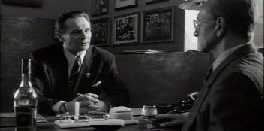
Oscar Schindler: My father was fond of saying you need three things in life. A good doctor, a forgiving priest, and a clever accountant. The first two, I've never had much use for them. But the third - (he raises his glass to recognize Stern, but the accountant doesn't respond) just pretend, for Christ's sake.
Stern: Is that all?
Oscar Schindler: I'm trying to thank you. I'm saying I couldn't have done this without you. The usual thing would be to acknowledge my gratitude. It would also, by the way, be the courteous thing.
Stern: You're welcome.
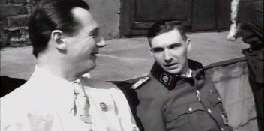
Amon Goeth: You want these people?
Oscar Schindler: These people. My people. I want my people.
Amon Goeth: Who are you? Moses? How much would you pay for a person ?
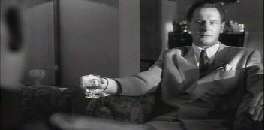
Oscar Schindler: I go to work
the other day. Nobody's there. Nobody tells me about this. I have
to find out, I have to go in. Everybody's gone.
Amon Goeth: They're not gone. They're here.
Schindler: They're mine! Every day that goes by, I'm
losing money. Every worker that is shot costs me money. I have to
find somebody else. I have to train them.
Goeth: We're going to be making so much money,
none of this is going to matter.
Schindler: It's bad business.
Goeth: Scherner told me something else about
you.
Schindler: Yeah, what's that?
Goeth: That you know the meaning of the word
'gratitude.' That it's not some vague thing with you like it is
with others. You want to stay where you are. You've got things
going on the side, things are good. You don't want anybody
telling you what to do. I can understand all that. You know, I
know you. What you want is your own sub-camp. Do you have any
idea what's involved? The paperwork alone? Forget you got to
build the f--king thing, getting the f--king permits is enough to
drive you crazy. Then the engineers show up. They stand around,
they argue about drainage, foundations, codes, exact
specifications, parallel fences four kilometers long, twelve
hundred kilograms of barbed wire, six thousand kilograms of
electrified fences...I'm telling you, you'll want to shoot
somebody. I've been through it, you know, I know.
Schindler: Well, you know, you've been through
it. You could make things easier for me. I'd be grateful.

Amon Goeth: They cast a spell on you, you know, the Jews. When you work closely with them, like I do, you see this. They have this power. It's like a virus. Some of my men are infected with this virus. They should be pitied, not punished. They should receive treatment because this is as real as typhus. I see it all the time. It's a matter of money? Hmm?
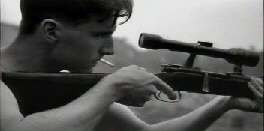
Amon Goeth: You're cruel Oskar. You're giving them hope. Now that's cruel!
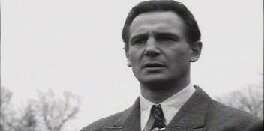
Oscar Schindler: So, what can I
do for you?
Krause: They say that no one dies here. They say
your factory is a haven. They say you are good.
Schindler: Who says that?
Krause: Everyone. My name is Regina Perlman, not
Elsa Krause. I've been living in Krakow on false papers since the
ghetto massacre. My parents are in Plaszow. Their names are Chana
and Jakob Perlman. They are older people. They're killing older
people now in Plaszow. They bury them up in the forest. Look, I
don't have any money. I-I borrowed these clothes, I'm begging you
- please, please bring them here.
Schindler: I don't do that. You've been misled.
I ask one thing: whether or not a worker has certain skills.
That's what I ask and that's what I care about...Such activities
are illegal. You will not entrap me, Miss Krause. Cry and I'll
have you arrested, I swear to God.


Oscar Schindler: People die,
it's a fact of life. He wants to kill
everybody? Great, what am I supposed to do about it? Bring
everybody over? Is that what you think? Send them over to
Schindler, send them all. His place is a 'haven,' didn't you
know? It's not a factory, it's not an enterprise of any kind,
it's a haven for rabbis and orphans and people with no skills
whatsoever. You think I don't know what you're doing? You're so
quiet all the time. I know. I know.
Stern: Are you losing money?
Schindler: No, I'm not losing money, that's not
the point.
Stern: What other point is -
Schindler: It's dangerous! It's dangerous to me.
You have to understand, Goeth is under enormous pressure. You
have to think of it in his situation. He's got this whole place
to run, he's responsible for everything that goes on here, all
these people - he's got a lot of things to worry about. And he's
got the war. Which brings out the worst in people. Never the
good, always the bad. Always the bad. But in normal
circumstances, he wouldn't be like this. He'd be all right.
There'd just be the good aspects of him - which - he's a
wonderful crook. A man who loves good food, good wine, the
ladies, making money -
Stern: - killing -
Schindler: He can't enjoy it....What do you want
me to do about it?
Stern: Nothing, nothing. We're just talking.
Schindler: (He pulls out a slip of paper and
reads a name) - Perlman.
Schindler unstraps his expensive wristwatch and instructs Stern: "Have Goldberg bring them over."
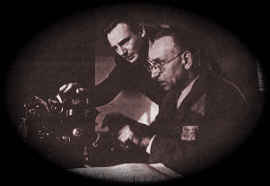
Itzhak Stern: How many cigarettes have you smoked tonight?
Oscar Schindler: Too many.
Itzhak Stern: You smoke, I smoke half.

Oscar Schindler: That's it. You
can finish that page.
Itzhak Stern: What did Goeth say about this? You
just told him how many people you needed, and - you're not buying them. You're buying
them? You're paying him for each of these names?
Schindler: If you were still working for me, I'd
expect you to talk me out of it. It's costing me a fortune.
Finish the page and leave one space at the bottom.
Stern: The list is an absolute good. The list is life. All around its margins lies the
gulf.
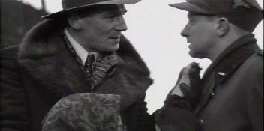
Oscar Schindler at Auschwitz: What are you doing? These are mine. These are my workers. They should be on my train. They're skilled munitions workers. They're essential. Essential girls. Their fingers polish the insides of shell metal casings. How else am I to polish the inside of a 45 millimeter shell casing? You tell me. You tell me!
Itzhak Stern: We've received an
angry complaint from the Armaments Board. The artillery shells,
tank shells, rocket casings, apparently all of them have failed
quality-control tests.
Oscar Schindler: Well, that's to be expected -
start-up problems. This isn't pots and pans. This is a precise
business. I'll write them a letter.
Stern: They're withholding payment.
Schindler: Sure. So would I. So would you. I
wouldn't worry about it. We'll get it right one of these days.
Stern: There's a rumor you've been going around miscalibrating
the machines. They could shut us down, send us back to Auschwitz.
Schindler: I'll call around, find out where we
can buy shells, pass them off as ours.
Stern: I don't see the difference. Whether
they're made here or somewhere else.
Schindler: You don't see a difference? I see a
difference.
Stern: You'll lose a lot of money, that's the
difference.
Schindler: Fewer shells will be made. Stern, if
this factory ever produces a shell that can actually be fired,
I'll be very unhappy.
The defeat of Nazi Germany - Oscar Schindler addresses all twelve hundred workers and guards gathered together for the first time - the guards are on an upper balcony and the workers are on the factory floor below :
I'm a member of the Nazi Party.
I'm a munitions manufacturer.
I'm a profiteer of slave labor.
I am a criminal.
At midnight, you'll be free and I'll be hunted.
I shall remain with you until five minutes after midnight. After
which time, and I hope you'll forgive me, I have to flee.
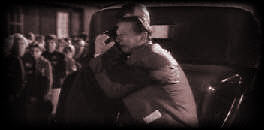
Oscar Schindler: I
could've got more...I could've got more, if I'd just ... I could've
got more ...
Stern: Oscar, there are eleven hundred
people who are alive because of you. Look at them.
Schindler: If I'd made more money ... I threw
away so much money, you have no idea. If I'd just ...
Stern: There will be generations because of
what you did.
Schindler: I didn't do enough.
Stern: You did so much.
Schindler: This car. Goeth would've bought
this car. Why did I keep the car? Ten people, right there. Ten
people, ten more people ... (He rips the swastika pin from his
lapel) This pin, two people. This is gold. Two more people. He
would've given me two for it. At least one. He would've given me
one. One more. One more person. A person, Stern. For this. I
could've gotten one more person and I didn't. I didn`t ..."

Awards:
: 1993 Academy Awards: Best Picture, Best Director
(Spielberg), Best Adapted Screenplay, Best Art Direction/Set
Decoration, Best Cinematography, Best Film Editing, Best Original
Score; 1993 British Academy Awards: Best Film, Best
Director (Spielberg), Best Supporting Actor (Fiennes) Best
Adapted Screenplay; 1994 Golden Globe Awards: Best
Film-Drama, Best Director (Spielberg), Best Screenplay; 1993
Los Angeles Film Critics Association Awards: Best Film, Best
Cinematography; 1993 National Board of Review Awards: Best
Film; 1993 New York Film Critics Awards: Best Film, Best
Supporting Actor (Fiennes) Best Cinematography; 1993 Writers
Guild of America: Best Adapted Screenplay; 1993 Academy
Award Nominations: Best Actor (Neeson), Best Costume Design,
Best Makeup, Best Sound, Best Supporting Actor (Fiennes); 1994
Golden Globe Award (Nominations): Best Actor-Drama (Neeson),
Best Supporting Actor (Fiennes), Best Original Score; 1994 MTV
Awards: Best Film, Breakthrough Performance (Fiennes).
Featured Actors: Liam Neeson, Ben Kingsley, Ralph Fiennes,
Embeth Davidtz, Caroline Goodail, Jonathan Sagalle, Mark Ivanir.
Director: Steven Spielberg.
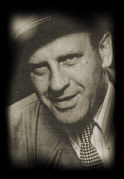
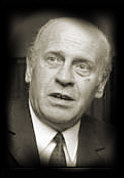
At the point when his ambitions have been realized and he could walk away from the war a rich man while "his Jews" die in Plazow and Auschwitz, Oscar Schindler desperately spends every penny he has bribing and paying off Nazi officials to protect and save his Jews. Later accounts have revealed that Schindler spent something like 4 million German marks keeping his Jews out of the death camps - an enormous sum of money for those times.
Oscar Schindler used all means at his disposal to ensure the safety of his Schindler-Jews, even Emilie Schindler`s jewels were sold, to bribe, to buy food, clothes, and medicine. He set up a secret sanatorium in the factory with medical equipment purchased on the black market. Here Emilie Schindler looked after the sick.
With his life as the stakes, he employed all his powers of persuasion, he bribed uninhibitedly, fought, begged to save his Jews from the gas chambers ...
In those years, millions of Jews died in camps like Treblinka, Majdanek, Sorbibor, Chelmno, Auschwitz and Bergen-Belsen - but Schindler`s Jews miraculously survived.
Oscar Schindler and his wife Emilie emigrated to Argentina in 1949. Eight years later, he left his wife and returned to Germany.
Oscar Schindler died in Frankfurt on the 9th of October, 1974, at an age of 66. From 1939 to the day he died he was such in love with his Jewish people, that he wanted to be buried in Jerusalem.
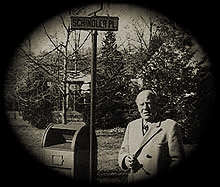
Schindler in USA shortly before he died
His friend Poldek Pfefferberg, a Schindler Jew, asked him shortly before he died, why he wanted to be buried here. Oscar Schindler answered :"My children are here ....."
In faithful acquiescence with his wishes, his earthly remains were taken to Israel, where his lead coffin was carried through the streets of Jerusalem.
Oscar Schindler - to be honest not one of the most devout sons of the church - was buried in the Catholic churchyard on Mount Zion in Jerusalem, in the presence of hundreds of weeping Schindler Jews. He was mourned on four continents ...
Adolf Hitler's SS Men Hitler surrounded himself with a small clique of fanatical, ruthless henchmen - a violent group of outsiders who rose to power in the Third Reich and established political and economic institutions of legitimized terror. These masterminds of death were found to be quite psychologically normal. They were men of fine standing, husbands who morning and night kissed their wives, fathers who tucked their children into bed. But murders, brutalities, cruelties, tortures, atrocities, and other inhuman acts were an everyday occurrence. The European Jews were the primary victims of the Nazis. In 1933 nine million Jews lived in the 21 countries of Europe that would be occupied by Germany during the war. By 1945 two out of every three European Jews had been killed. But Jews were not the only group singled out for persecution by Hitler's Nazi regime. One-half million Gypsies, 250,000 mentally or physically disabled persons, and more than three million Soviet prisoners-of-war also fell victim to Nazi genocide. Jehovah’s Witnesses, homosexuals, Social Democrats, Communists, partisans, trade unionists, and Polish intelligentsia were also victims of the hate and aggression carried out by the Nazis. |
www.oskarschindler.com
Schindler Stories
Oscar
Schindler - why did he do it ?
Whoever
saves one life ...
The
entire Schindler`s List
Anna
Duklauer Perl
Four
Schindler Survivors
Oscar
Schindler - A Photo Album
www.auschwitz.dk www.emilieschindler.com www.shoah.dk
© 2007-2009
Louis Bülow Privacy
All Rights Reserved.